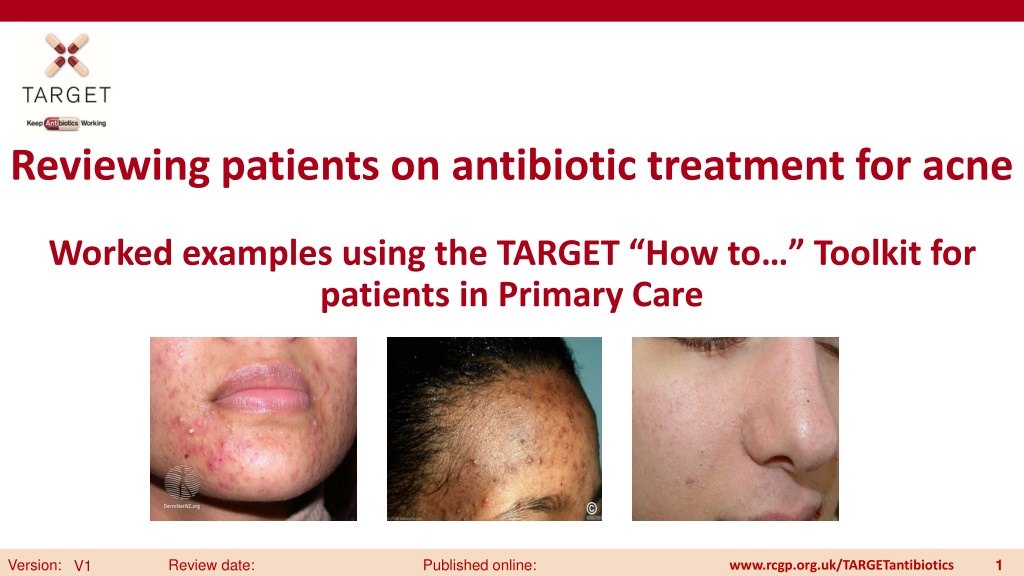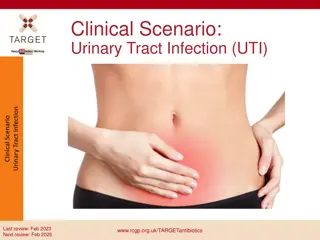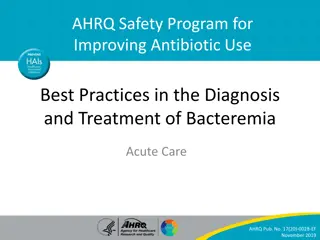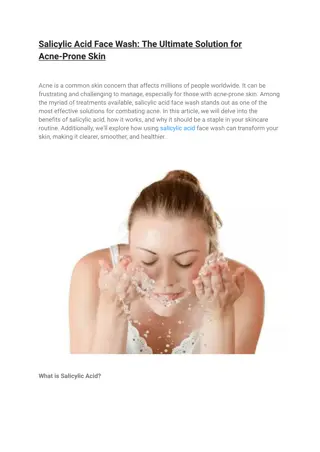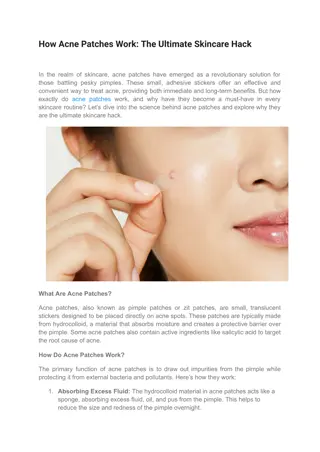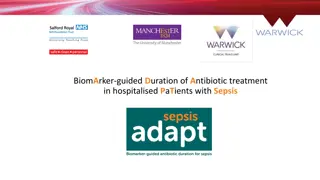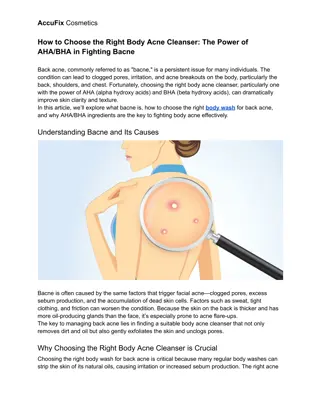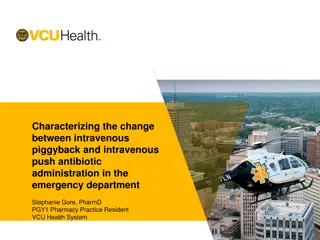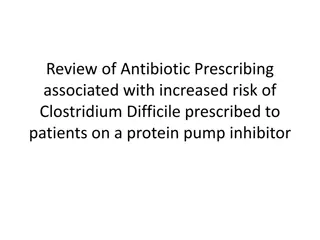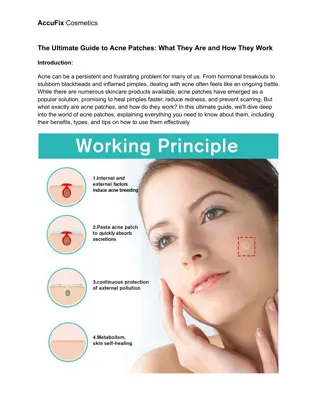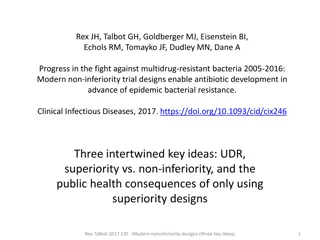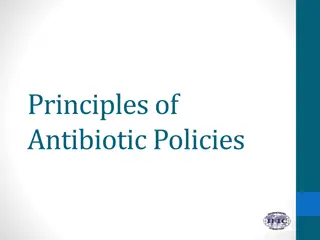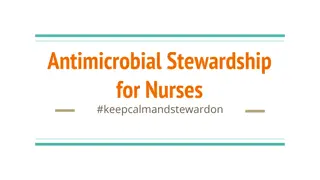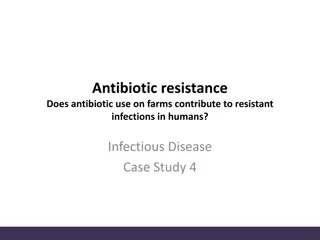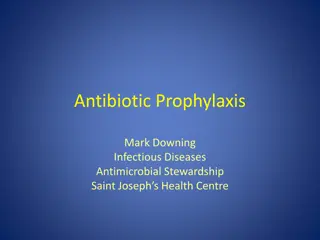Reviewing patients on antibiotic treatment for acne
Understanding the importance of reviewing patients on antibiotic treatment for acne, the resource provides insights on managing acne patients currently on antibiotics, referral considerations, and self-care advice. It emphasizes the need to address antibiotic resistance concerns and the challenges of withdrawing antibiotic treatment for acne.
Download Presentation

Please find below an Image/Link to download the presentation.
The content on the website is provided AS IS for your information and personal use only. It may not be sold, licensed, or shared on other websites without obtaining consent from the author. Download presentation by click this link. If you encounter any issues during the download, it is possible that the publisher has removed the file from their server.
E N D
Presentation Transcript
Reviewing patients on antibiotic treatment for acne a Worked examples using the TARGET How to Toolkit for patients in Primary Care Version: Review date: Published online: 1 V1 www.rcgp.org.uk/TARGETantibiotics
How to use this resource The TARGET acne How to worked examples are a resource designed to be used with the TARGET acne How to toolkit for the review of antibiotic prescribing of patients with acne in primary care. This slide deck will take you through three worked examples and can be used for your own learning or to deliver to your team. The PowerPoint notes contain further information and slide references The slides can be used by medical prescribers, non-medical prescribers and pharmacy professionals to review the clinical management of patients with acne. V1 September 2026 September 2023 Version: Review date: Published online: 2 www.rcgp.org.uk/TARGETantibiotics
Aims Understand and discuss; 1. Why it is important to review patients on antibiotic treatment for acne 2. How to review and manage patients with acne that; Are currently on antibiotic treatment Require referral Have dark skin and hyperpigmentation/acne scarring Require stepping down of treatment 3. The list of considerations when carrying out a patient review and assessment including key points on mental health and self-care advice Version: Review date: Published online: 3 www.rcgp.org.uk/TARGETantibiotics
Antimicrobial resistance Diabetes and cancer combined AMR 2050 AMR in 2050 10 million Deaths attributed to antimicrobial resistance (AMR) every year Tetanus 60,000 10,000,00010,000,000 9,000,000 9,700,000 Road traffic accidents 1.2 million 8,000,000 Cancer 8.2 million 7,000,000 AMR now 700,000 (low estimate) 6,000,000 5,000,000 Cholera 100,00 120,000 4,000,000 Measles 130,000 3,000,000 2,000,000 Diarrhoeal disease 1.4 million Diabetes 1.5 million 1,000,000 0 (O Neill, 2016) Version: Review date: Published online: 4 www.rcgp.org.uk/TARGETantibiotics
Why review patients with acne? Research has highlighted growing concerns of antibiotic resistance in treatment of acne and prescribing patterns suggest an overuse of antibiotics in patients 1 National data reveal that acne is one of the most common indication for long-term and/or repeated antibiotic use 2 Conversations with patients about withdrawing acne antibiotic treatment have been deemed difficult and sensitive (Platt D, 2021) 3 Version: Review date: Published online: 5 www.rcgp.org.uk/TARGETantibiotics
How to manage patients Treat/Refer Educate Advice Review Version: Review date: Published online: 6 www.rcgp.org.uk/TARGETantibiotics
Scenario Patient review Treatment Advice Scenario 1 Review outcome: change of treatment Consider the following details: 18-year-old female non pregnant Indication - Acne Vulgaris Lymecycline 408mg daily for 12 weeks No topical treatment has been issued On examination Moderate to severe acne Version: Review date: Published online: 7 www.rcgp.org.uk/TARGETantibiotics
Scenario Patient review Treatment Advice Patient centred review Item to consider Patient response Establish history of patients' condition Patient baseline habits Are they under a specialist consultant Treatment/Prescription history Has had acne since puberty Condition and consultation history Not currently under a specialist consultant Lymecycline - once daily No OTC/herbal meds None reported Side effects to treatment Treatment History Compliance to treatment Not using topical treatment patient did not realise she was meant to continue with topical treatment Feels current treatment has had minimal effect Patient s perception of their treatment Explore impact acne has had on self-esteem or mental health Recent weight gain and stress caused by exams. She feels this has made her acne worse. Acne has caused feelings of distress and anxiety and has affected her confidence in going out Patient Impact and preference What are the patient's preferences and expectations from treatment? aim is to see a noticeable reduction but understands acne may not completely clear happy to continue topical and oral treatment Version: Review date: Published online: 8 www.rcgp.org.uk/TARGETantibiotics
Scenario Patient review Treatment Advice Treating your patient Treating or referring the patient Continue oral antibiotic therapy for a further 12 weeks AND prescribe fixed combination of topical adapalene with topical benzoyl peroxide applied once daily in the evening Review Review treatment after 12 weeks Assessif patient s acne has improved, and if there has been any side effects to treatment If acne has completely cleared, consider stopping the antibiotic but continuing the topical treatment Consider if referral to specialist consultant is required Review patient acne photos to monitor treatment success Version: Review date: Published online: 9 www.rcgp.org.uk/TARGETantibiotics
Scenario Patient review Treatment Advice Education and advice Education Antibiotics may cause systemic side effects and antimicrobial resistance. Provide evidence for skin care and diet to help acne Noticeable effects can take between 6-8 weeks, therefore it is important to complete the course Aggravating and modifiable risk factors - How to Booklet_Acne_TARGET V1.1_Final.pdf (rcgp.org.uk) Advice Mental health services for psychological distress caused by acne and/or scarring shared care decision on referral Signpost to digital apps such as - Dermatology digital playbook - Digital playbooks - NHS Transformation Directorate (england.nhs.uk). Provide advice on contraception topical retinoids and oral tetracyclines are contraindicated in pregnancy Oral tetracyclines can cause photosensitivity use suitable SPF if going out in the sun. Avoid strong sunlight while using benzoyl peroxide and use oil free sunscreen with SPF30 or above Version: Review date: Published online: 10 www.rcgp.org.uk/TARGETantibiotics
Scenario Patient review Treatment Advice Treatment options For a complete list of treatment options for acne visit section 3.3.2, table 1 in The How to ? Series: Acne Vulgaris. Taken from [NG198] Version: Review date: Published online: 11 www.rcgp.org.uk/TARGETantibiotics
Scenario Patient review Treatment Advice Scenario 2 Review outcome: specialist referral Consider the following details: 21-year-old female non pregnant Current Indication Acne Vulgaris Completed 3 months course lymecycline and has been prescribed topical treatments On examination Moderate acne Post inflammatory hyperpigmentation Version: Review date: Published online: 12 www.rcgp.org.uk/TARGETantibiotics
Scenario Patient review Treatment Advice Acne on black skin Acne in black skin tends to present more as inflammatory acne (papules and pustules) than non-inflammatory (whiteheads and blackheads) Tends to have fewer severe acne lesions (nodules & cysts) Tends to scar less Has the highest incidence of hyperpigmentation Has a higher chance of keloid scarring (especially on the chest and back) Does not tend to suffer with rosacea Very common in both adolescents and adults of African decent Version: Review date: Published online: 13 www.rcgp.org.uk/TARGETantibiotics
Scenario Patient review Treatment Advice Patient Centred Review Item to consider Establish history of patients' condition Patient baseline habits Are they under a specialist consultant Patient response Has had acne since teenager Generally is well, no low mood reported Not currently under a specialist consultant Condition and consultation history Treatment/Prescription history 12 weeks completed of Lymecycline - once daily Prescribed Topical adapalene 0.1% and Benzoyl Peroxide 5%. No side effects reported Patient is compliant with her oral antibiotics and topical treatment Adheres to skin care advice avoids using oil-based hair products near forehead Side effects to treatment Compliance to treatment Treatment History Patient s perception of their treatment Explore impact acne has had on self- esteem or mental health Feels current treatment has had minimal effect Concerned about scarring, feels compelled to always use camouflage make-up to cover up acne Patient Impact and preference What are the patient's preferences and expectations from treatment? Would like to try other treatments Happy to be referred to a specialist Would like to see a noticeable improvement in her acne Version: Review date: Published online: 14 www.rcgp.org.uk/TARGETantibiotics
Scenario Patient review Treatment Advice Treating your patient Treating or referring the patient Refer patient to secondary care for specialist review Consider a further 12 weeks of oral antibiotic therapy alongside topical treatment whilst patient awaits review by specialist Review Review patient after 12 weeks. If patient is being seen by specialist consultant, refer to correspondence for ongoing treatment Review patient acne photos to monitor treatment success Version: Review date: Published online: 15 www.rcgp.org.uk/TARGETantibiotics
Scenario Patient review Treatment Advice Education and advice Education Antibiotics may cause systemic side effects and antimicrobial resistance. Post inflammatory hyperpigmentation can take several months to noticeably reduce Provide evidence for skin care and diet to help acne Aggravating and modifiable risk factors - How to Booklet_Acne_TARGET V1.1_Final.pdf (rcgp.org.uk) Advice Mental health services for psychological distress caused by acne and/or scarring shared care decision on referral Signpost to digital apps such as - Dermatology digital playbook - Digital playbooks - NHS Transformation Directorate (england.nhs.uk). Provide advice on contraception topical retinoids and oral tetracyclines are contraindicated in pregnancy Oral tetracyclines can cause photosensitivity use suitable SPF if going out in the sun. Avoid strong sunlight while using benzoyl peroxide and use oil free sunscreen with SPF30 or above Version: Review date: Published online: 16 www.rcgp.org.uk/TARGETantibiotics
Scenario Patient review Treatment Advice Referral to specialist care People with acne fulminans, refer on the same day to the on-call hospital dermatology team Urgent referral There is diagnostic uncertainty about patient s acne Or acne conglobata: serious form of nodulo-cystic acne with scars and abscesses over/under the surface of the skin Severe acne/ unresponsive to treatment Referral to dermatology Patient with acne experiences significant psychological distress or a mental health disorder, including those with a suspected current or past history of: Suicidal ideation or self-harm Severe depressive or anxiety disorder Body dysmorphic disorder Referral for mental health Version: Review date: Published online: 17 www.rcgp.org.uk/TARGETantibiotics
Scenario Patient review Treatment Advice Referral to specialist care Mild to moderate acne that has not responded to two completed 12- week courses of treatment Moderate to severe acne which has not responded to previous treatment (dual therapy including oral antibiotic) Acne with scarring Acne with persistent pigmentary changes Acne of any severity, or acne-related scarring, that is causing or contributing to persistent psychological distress or a mental health disorder Any patient for whom oral retinoid therapy (isotretinoin) is being considered (NICE b, 2021) Considerations for referral to dermatology Consider condition-specific management or referral to a specialist (reproductive endocrinologist) if a medical disorder or medication is likely to be contributing to a person's acne Other Version: Review date: Published online: 18 www.rcgp.org.uk/TARGETantibiotics
Scenario Patient review Treatment Advice Scenario 3 Review outcome: stepping down treatment Consider the following details: 24-year-old male Has been issued 2 prescriptions for lymecycline 408mg in the last 12 months On examination Mild acne Version: Review date: Published online: 19 www.rcgp.org.uk/TARGETantibiotics
Scenario Patient review Treatment Advice Patient centred view Item to consider Establish history of patients' condition Patient baseline habits Patient response Has had acne since teenager Generally is well, though suffers from poor sleep and stress. no low mood reported. Feels acne breakouts due to stress Not currently under a specialist consultant Condition and consultation history Are they under a specialist consultant Treatment/Prescription history 12 weeks completed of Lymecycline - once daily Has had repeated courses of antibiotics over the last 2 years Prescribed Topical azelaic acid applied twice a day No side effects reported Patient is compliant with his oral antibiotics and topical treatment Adheres to skin-care advice Side effects to treatment Compliance to treatment Treatment History Patient s perception of their treatment Concerned about taking too many antibiotics and building resistance Explore impact acne has had on self-esteem or mental health Does not report any negative impact on mental health or self-esteem Patient Impact and preference What are the patient's preferences and expectations from treatment? Would like to try other treatments Happy to be referred to a specialist if needed Does not want acne to get worse Version: Review date: Published online: 20 www.rcgp.org.uk/TARGETantibiotics
Scenario Patient review Treatment Advice Treating your patient Treating or referring the patient Discontinue oral antibiotic treatment Topical treatment to prescribe : Fixed combination of topical adapalene with topical benzoyl peroxide Review Review topical treatments at next review appointment in 12 weeks If acne recurs on cessation of antimicrobial therapy despite topical treatment, review sooner: if rapid relapse consider a systemic retinoid (via dermatology referral secondary care). if a longer remission was achieved, an intermittent 3-month course of systemic antimicrobials can be used. If longer remission is achieved but patient needs more than two repeat courses of three months in one year for relapse, consider referral. Review photos at next review to monitor condition and appearance Version: Review date: Published online: 21 www.rcgp.org.uk/TARGETantibiotics
Scenario Patient review Treatment Advice Education and advice Education Provide evidence for skin care and diet to help acne Aggravating and modifiable risk factors - How to Booklet_Acne_TARGET V1.1_Final.pdf (rcgp.org.uk) Advice Mental health services for psychological distress caused by acne and/or scarring shared care decision on referral Signpost to digital apps such as - Dermatology digital playbook - Digital playbooks - NHS Transformation Directorate (england.nhs.uk). Oral tetracyclines can cause photosensitivity use suitable SPF if going out in the sun. Avoid strong sunlight while using benzoyl peroxide and use oil free sunscreen with SPF30 or above Version: Review date: Published online: 22 www.rcgp.org.uk/TARGETantibiotics
Additional information: Relapse Situation Response If acne responds adequately to a course of an appropriate first-line treatment but then relapses consider either: another 12-week course of the same treatment, or an alternative 12-week treatment see NICE. Acne vulgaris: management. 2021 [Available from: https://www.nice.org.uk/guidance/ng198] If acne relapses after an adequate response to oral isotretinoin and is currently mild to moderate offer an appropriate treatment option see NICE. Acne vulgaris: management. 2021 [Available from: https://www.nice.org.uk/guidance/ng198] If acne relapses after an adequate response to oral isotretinoin and is currently moderate to severe, offer either: a 12-week course of an appropriate treatment option or re-referral, if the person is no longer under the care of the consultant dermatologist-led team. If acne relapses after a second course of oral isotretinoin and is currently moderate to severe further care should be decided by the consultant dermatologist-led team. If the person is no longer under the care of the consultant dermatologist-led team, offer re-referral. Version: Review date: Published online: 23 www.rcgp.org.uk/TARGETantibiotics
Take home messages 1. Do not use oral antibiotic monotherapy; combine oral antibiotic with a topical non-antibiotic topical agent to treat acne. 2. Do not use oral or topical antibiotic treatment for longer than 6 months unless in exceptional circumstances Use a step-wise approach when reviewing and treating patients with acne Take note of any mental health issues caused by acne or scarring and refer if required 3. 4. 5. Treat patients with darker skin tones early and more aggressively, including earlier consideration of referral to secondary care or a dermatology service Version: Review date: Published online: 24 www.rcgp.org.uk/TARGETantibiotics
